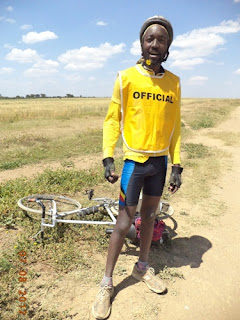Although the lake is too salty to drink or wash clothes, if a hole is dug only a few feet away, the water is much less salty and can be used for washing. In the picture below, you can see a young woman washing in one of the holes that has been dug next to the lake. In another photo, you can see a young boy next to Lake Simbi. He is gathering the salty soil to sell to venders who will process it into a salt lick for farmers to give their cattle. Not only does the salt kill stomach worms, it also increases appetite so the cow will fatten up more quickly.
I traveled a couple more days until I arrived, in the rain, at a small town called Kipkelion. It was in a valley, surrounded by green hills with tea, corn, and grass to graze the thousands of dairy cows in the area. It reminded me of the Swiss Alps, where I lived in my 20's. The only thing missing was the tinkling of cow bells. At the hotel, which I paid my typical $3.00, I met a Masai woman named Leah. Her husband was in jail and she was caring for her three young children on a paltry salary. She boiled water for my shower (it was freezing there!) and took me to the local bar for a Tusker. A group of young soldiers were playing pool, so of course I challenged one of them to a game. I learned to play pool as a child, in our basement, but hadn't played in years. My competitor had a Kikuyu nickname, which I forgot, but in English it meant "The one who never dies". I actually won the game, which was probably an embarrassment to the young man.Fortunately, he only had to pay 10 shillings for the next game. It's hard to leave some of these small towns because of the memories they contain, but I didn't think I could bear another day of rain and endless mud.

























